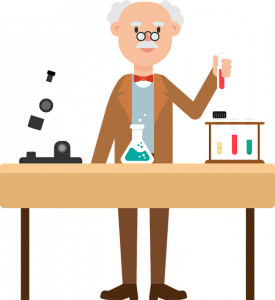Everything you need to know about best careers in chemistry
Chemistry is a science, so it can be easy to overlook the importance of chemistry for your future. But without a good understanding of chemistry, many advances in technology would not have been possible, and our lives would be drastically different from today.
In this article, we will be highlighting careers related to Chemical Science, which will provide you with opportunities for challenging work. We will also provide insight into the daily tasks and career outlooks of those who work as Chemists.
Careers in Chemistry – What you need to know
There are many different types of careers in chemistry. Some focus on chemical reactions, while others focus on developing chemical compounds to find new medicines. Depending on the career and the concentration, chemists get involved in a lot of different areas. Equally, they all have their own challenges, some requiring more mathematical skill than others.
Chemists often split themselves into different fields that require various skills, such as analyzing data or creating chemical compounds to treat diseases. A chemist can specialize in one field or work across several fields depending on which career path he or she chooses.

A chemist can work in a variety of industries, including oil companies, pharmaceutical companies, and chemical companies. Chemists find their jobs as chemists because they enjoy learning about new chemicals or discovering new and better ways to do things. Chemists will often take jobs that allow them to do research on many different chemicals at different laboratories within their respective companies.
Whether it is for the sake of curiosity or helping to solve environmental problems, a chemist can work on a variety of projects related to several different fields. A chemist can choose to work in two main areas are research and development and quality control.
Research and development jobs are usually long hours and involve long periods of inactivity, while quality control involves constant monitoring of chemical reactions, which sometimes can be very dangerous working conditions.
Top careers in chemistry
Chemists are the progenitors of new compounds and compounds that solve problems, save lives, and make life easier. They are found in just about every field and industry. Their work has been instrumental to the building of modern society. The following list is a top-ranking of careers in chemistry.

1) Organic chemists
Organic chemists focus on how carbon atoms bond together to form molecules. They are great for synthetic and medicinal chemistry projects.
2) Inorganic chemists
Inorganic chemists explore the art of combining non-carbon elements to form new compounds. Their work revolved around ionic bonding, which is a little more complex than carbon-carbon or carbon-oxygen bonds. They are great for the manufacturing industry, glassworks, and even electronics.
3) Biochemists
Biochemists focus on a broad spectrum of life science substances that perform functions all over our bodies. These substances include cell membranes, amylases (carbohydrate digesting enzymes), and insulin (which is produced by pancreas cells).
4) Theoretical chemists
Theoretical chemists focus on a field of chemistry that is still being explored: quantum mechanics. Their work involves developing new advancements in quantum mechanics and its applications in the real world.
5) Forensic chemists
Forensic chemists combine analytical chemistry with criminology to figure out if a crime has been committed and who has done it. This often includes DNA evidence from blood, semen, or saliva found at crime scenes or on pieces of evidence like hair strands or fibers. By combining chemistry with criminology, forensic chemists can often catch people who have eluded the police for years.
6) Nuclear chemists
Nuclear chemistry combines chemistry with nuclear physics (the study of subatomic particles). It is often a discipline that originates from physics but requires chemical expertise to analyze the effects of nuclear fusion and fission. Nuclear chemists work with the most dangerous chemical element on earth: plutonium.
The seven main subfields of chemistry – What are the main subfields of chemistry?

1) Physical chemistry
Physical chemistry involves the composition and properties of material substances, like the chemical composition of plastics or metals. Physical chemists are also critical for analyzing materials that insolubilize when dissolved in water.
2) Biochemistry
Biochemists study organisms (like plants or animals) that employ photosynthesis and chemosynthesis (the process of using sunlight to produce food via carbon dioxide). They also study enzymes, which are catalysts used by cells to promote chemical reactions. Biochemists are also critical for protecting crops from insects, disease, and weather.
3) Medicinal chemistry
Medicinal chemists combine physical chemistry with biology to develop new drugs or treatments. They seek out new ways to relieve pain and sickness through the use of chemicals that are taken into our bodies.
4) Analytical chemistry
Analytical chemists work in a chemical laboratory preparing samples for testing. These samples include substances such as foods, soil, water, and biological materials like blood or urine. Analytical chemists can often see chemical analysis done much faster than other types of scientists.
5) Polymer science
Polymer science is the study of polymers (material that is long chains of repeating units). Some examples of polymers would be plastics and rubbers. Polymers are what make up some of the most influential inventions in our history, such as the Internet, cell phones, and space shuttles.
6) Physical organic chemistry
Physical organic chemistry is a subfield of chemistry that blends all facets of organic chemistry with the physical properties of matter. Some examples include color changes in chemical reactions or phase changes that occur when substances are heated or cooled to extreme temperatures.
7) Inorganic chemistry
Inorganic chemists study how atoms combine together to form molecules. These molecules often have properties that react with other molecules or even dissolve various elements and materials (like metals). Some examples of inorganic chemists would be those who study the composition of rocks and minerals.
Chemists do research
Chemists do research to solve problems in the field of chemistry. Whether this is understanding the way someone reacts to medications or trying to get a new drug approved for use. Most chemists do research from their own homes and offices, but there are also large research facilities that allow chemists such as these to work with other scientists.

Chemist’s Typical Tasks
Collecting data, analyzing data, and writing reports of findings. Trying to solve problems in the field of chemistry. Writing up patents for inventions made in the field of chemistry.
Chemist’s Daily tasks
Chemists gather data from sources such as lab experiments and articles in journals. They analyze that information to try and find a solution to a problem or prove/disprove a theory. Depending on their specialty, chemists spend a lot of time in the laboratory or out researching facilities or other labs. They may also be involved in marketing their research and communicating with other scientists involved in different research areas.

Like most other scientists, chemists get involved in the research and development of different chemicals. This is what enables them to make new drugs or find new ways to stop the disease from spreading. It also allows them to make their own inventions, which allows them to profit from their work. Chemists may spend time doing experiments, analyzing data, or writing up papers in their lab.
Some people want to spend their entire lives in the laboratory, while others want a more hands-on role. This is why you should think about how chemistry will fit into your life. Chemists are often involved in researching new drugs and other interesting topics, which can involve travel.
There are many different career paths that go into Chemistry, and as you can see, they involve a lot of different areas of work. They also need a very decent understanding of mathematics and science because there is no space for winging it! Depending on your strengths, it’s important to choose the right career path that fits you and your personality.
The average chemist works for about 25 years and then retires. However, these averages can vary greatly. Some chemists work in the field for decades and retire after 25, while others work for very short periods of time and quickly move on to a different career path. Some work as a chemist for more than one career path, while other chemists prefer to focus on one career path. It all depends on the individual.
Most Chemists want to go into the field from the beginning of their studies, but there are many different ways you can go about finding a career after graduating. Chemists can go into academia and teach at universities around the world, or they can work for large companies that help with chemical research and development. There are also many companies specializing in finding new chemical compounds, which allows chemists to work horizontally across different job paths.
Chemists are a unique profession that can be incredibly rewarding and incredibly challenging. Chemists worldwide spend their days working on research in different labs while also involved with marketing their work and developing new chemical compounds.
Working at home as a chemist is possible, but there are many variables that come into play when looking at doing so. It’s important to consider your schedule and what it will take to find the right balance of work and life. Sometimes it’s a good idea to contact a company that works with scientists and request job opportunities that are related to your career. If you’re looking for something different, the job market for chemists is always expanding.
Chemistry is an incredibly important field of science, and its importance will only increase in the future. As chemists continue to improve the way we think about producing chemicals, there will be plenty of future opportunities!
How chemistry is done
Chemistry is often defined by its methodology, which explains how scientists proceed to test their hypotheses and answers. The methodology can be broken down into experiments, models, and theories. The three main areas of methodology are experimentation, modeling, and theory. These different areas complement each other very well and make chemistry one of the most disciplined fields out of all the sciences.

Experimentation
Experiments are used as a means to test hypotheses that have been formed from previous research or simulations. The experimentation process involves everything from analyzing data to preparing samples for testing and then performing the test on the samples.
Experiments are often ad hoc, which means that a hypothesis has not been formulated yet, but something has been discovered. This is where the term “ad hoc” comes in; a scientist knows a hypothesis that an experiment will be performed to test it. A critical aspect of this type of science is the reproducibility of experiments. If an experiment can be reproduced over and over again by other scientists, then this technique is considered reliable.
Modeling
Modeling techniques describe how chemical reactions occur or how matter behaves in different conditions and at different temperatures. Models can be used to describe the results of an experiment or can be used to simulate an event or process that has not been observed. Models are very important for understanding complex issues and predicting potential outcomes in the future.
Theories
Theories are some of the most fundamental aspects of science. Theories use models, experiments, and observations to explain why certain things happen or how they relate to each other at their core; however, theories are tested by other scientists. If other scientists cannot find logical flaws in a theory, this is considered a very reliable science model that can be trusted.
Why is chemistry important?
Chemistry is important because it applies to everything around us. From the food you eat to the clothes you wear, chemistry exists in almost every aspect of life. Chemistry also gives us all sorts of technology that we rely on every day, from computers to space shuttles to cell phones! We are constantly looking for new ways to change and improve how we do something, and that’s where chemistry comes in. Chemistry is such a huge field that there is always something new to learn and improve, which is why it’s important in society.
Chemistry has a very large impact on society since the best way to understand how a substance works and what it can be used for is through experimentation. Chemistry teaches us to be problem solvers and critical thinkers because of all the different variables involved in a problem; without chemistry, you would never have the ability to solve it. Chemistry also helps us develop critical thinking skills by helping us evaluate facts and make good (educated) decisions on both ends of scientific experiments.


